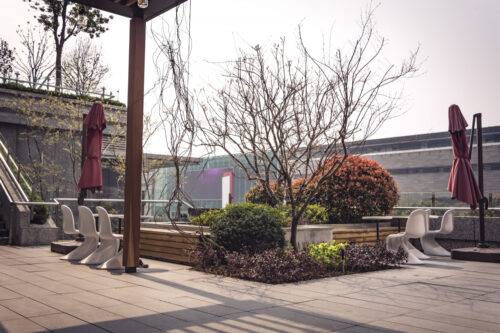Porcelain or natural stone paving for your patio?
Compared to natural stone, porcelain paving is the new kid on the block. However, over recent years it has gained in popularity
Compared to natural stone, porcelain paving is the new kid on the block.
However, over recent years it has gained in popularity due to its inherent properties including durability and versatility.
That’s not to say natural materials like sandstone, slate, and granite are falling out of favour; on the contrary, the appeal of the traditional and familiar is still strong, which is why you need to consider what’s important to you when choosing paving for your patio.
The right paving for this kind of job should be able to sustain busy everyday traffic, cope with the extremes of the British weather, and not be too high maintenance (unless you have staff, you really don’t want to be out there all the time dealing with algae, moss and staining).
Porcelain paving vs natural stone
So, what makes both natural stone and porcelain so suitable for your outdoor project?
Porcelain
Pros
Durability
Because of its composition, a mixture of dense clay and stone, and the fact it’s fired to extremely high temperatures, porcelain is hardwearing.
Easy to maintain
This nonporous material is great at repelling moisture, and that means dirt and spills are not absorbed, making it perfect for a patio where people will be eating and drinking.
It won’t fade
You’ll likely be positioning your patio in an area where you’ll get the sun. With that in mind, the fact that porcelain is fade-resistant is a huge advantage.
Non-slip
The combination of dense clay with granite makes porcelain nonporous. Therefore, any surface water evaporates leaving a non-slip exterior. Again, that makes it great for patios where you can expect people to congregate.
Cheaper
It’s high-end, but not as expensive as some types of natural stone.
Natural stone
Durability
Some types of natural stone are extremely durable.
Limestone, for example, is a sedimentary rock formed over millions of years that compresses into a hard substance.
This makes limestone an extremely hardwearing and practical material and great for garden patios.
Ease of maintenance
Most natural stone is not as low maintenance as porcelain, and needs to be sealed on a regular basis to ensure that it doesn’t stain or become slippery with algae and moss.
Fading
Some natural stone will fade in the sunlight but don’t let that put you off, it’s the weathering part that can add to its charm.
Non-slip
Unlike porcelain, natural stone can be prone to slipperiness. However, if you treat it and ensure that it’s cleaned regularly, the risks can easily be minimalised.
Cheaper
There are natural stone materials which are cheaper – sandstone, for example – so if you’re on a tight budget then you might want to consider this as an option.
As you can see, both porcelain and natural stone can be fantastic for patios.
Which should you choose?
At Forward Builders’ Supplies, you can check out a wide range of stunning porcelain pavers that are perfect for your landscaping project.

 Log Out
Log Out 









The information below is required for social login
Login
Register
Fill in the form below to create your new account